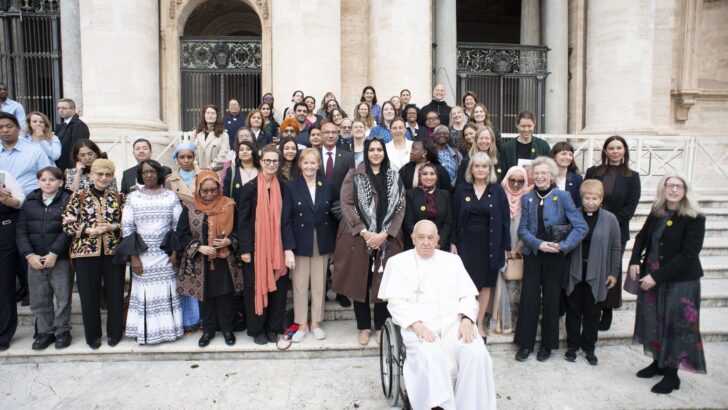Climate change and climate justice have been in the front of people’s minds for decades now. This battle to reverse damages and save the planet has many advocates, one of them is Lorna Gold, chair of the Laudato Si’ Movement.
Originally from Scotland, Ms Gold is passionate about the faith based environmental movement. She published a few books and articles on the movement in the face of climate emergency and biodiversity loss. Recently, she went to a women-led, multi-faith climate action event in Frascati, Italy.
Ms Gold talked to The Irish Catholic about the role of women of faith in the climate justice battle.
Q: What is climate justice?
A: Climate justice is the recognition that the causes and effects of climate change are not felt equally. Those who have largely caused the problem – those who have benefited from burning fossil fuels and high consumption – are not the ones paying the biggest price. The biggest price are those living in poverty, who have done least to cause the problem and are least able to cope with extreme weather. Women and children are disproportionately affected. Climate justice is therefore about putting their needs and rights front and centre.
Q: Tell me about your background and when you felt the calling to fight for climate justice.
A: I am originally from Scotland and grew up in the shadow of Scotland’s largest oil refinery, Grangemouth. My ‘calling’ to fight for a just and sustainable world I think came when I was very young. In the mid-80s I did a school project on the impact of the oil industry and Grangemouth refinery. It is when I first came across the idea of ‘global warming’. I was horrified that this was happening and the impact it would have on my generation. I started back then to campaign for sustainable development. That desire to work for justice brought me eventually to Ireland to work for Trócaire, and then now to work for the Laudato Si’ Movement. Having my own children was a great motivator too and led me to write my book Climate Generation – Awakening to our Children’s Future. I love my work – it is truly a calling to integrate my deep faith values with my vision for a better world.
Q: How important it is to have people of faith battling for climate justice?
A: I would say that now more than ever it is essential if we are to keep hope alive. Climate justice is a moral issue and without a belief framework rooted in deep values, whether faith or otherwise, is really important. In my work over several decades now I have discovered that different faith traditions all have significant contributions to make to climate justice. If you just think about the reach of faith communities. Over 80% of the world’s population adhere to a faith. Faith communities control around 12% of the land on the Earth. They have countless houses of worship, schools, universities, hospitals, development projects.
Already there is a huge amount happening to ‘green’ all of these facilities and educate the faithful. Here in Ireland the bishops have collectively called for a ‘Return to Nature’. In the Catholic Church globally we have the wonderful Laudato Si’ Movement which has trained over 40,000 animators, supported the Laudato Si’ Action Platform and produced a great movie with the Pope called The Letter, which I was lucky to be in. In the Muslim world there is now Al Mizan, a similar teaching to Laudato Si’ which could have an impact on many millions of Muslims. Other faiths such as Sikhism have sacred forests. What faiths can bring is a deep motivation to care – which sees the earth as sacred, as something to cherish. They also bring the structures to make that motivation translate into action.
Q: Does having female people of faith in this battle make a difference in the results?
A: From experience we know that many religious organisations can be quite patriarchal in structure and women are often excluded or curtailed from engaging in the highest echelons of decision-making. The Catholic Church is no exception though some steps have been taken! Women of faith across the world play a critical role in so many aspects of faith communities – from administration of organisations to financial decision making or setting curriculums for catechesis. Religious sisters in particular are often in the frontlines of dealing with poverty and injustice across the world – holding communities together when everyone else has left. We know that lifting up the voices of women on the frontlines and in decision-making, and bringing those women together, can significantly accelerate action. That is why a group of women of faith from many traditions have decided to come together to form a new alliance called ‘Women Faith and Climate Network’. Our aim is to use our collective power to foster radical collaboration for climate justice.
Q: Is there still time to action and try to reverse or stop more climate change disasters from happening?
A: I have been working on this all my life – so possibly the 1980s was the time to act. What we are seeing now is the direct results of our failure to act on the knowledge that we had back in the 1980s. The science is much more compelling now but there is still strong resistance to tackling the root causes of climate injustice. It is deeply uncomfortable as it means potentially changing our lifestyles – reducing and changing consumption for those who are high consumers.
The good news is that we now have all the technology we need to make most of these changes rapidly! However, we cannot change our lifestyles without robust regulation which addresses the vested interests of key sectors – fossil fuel industry, financial industry, agricultural sector etc. Without those large-scale changes, particularly in the energy sector, happening very quickly our emissions will continue to go up and things will continue to deteriorate.
That does not mean that we can just throw our hands in the air and give up. There are clear choices now. I believe that so long as we are on this earth there is always a possibility that things can improve, that people can change – that a conversion of heart can happen. Rather than giving up now is a time to lean into the problem and take action!
Q: Can you tell me a little about the Frascati event and the importance of having such gatherings?
A: As mentioned above, women of faith have an important role in accelerating the awareness and action on climate change in our communities and more broadly. That is why a group of women leaders in different faith communities decided to come together to discuss how we can collaborate more on joint actions. The event brought together around 50 women representing 8 different faith traditions and explored the different ways in which we could collaborate to accelerate and deepen climate justice. We agreed at the meeting to set up a new network called the ‘Women Faith and Climate Network’ which will aim to continue to build networks of friendship between women of faith working on climate; tell the stories of women who are on the frontlines of climate action; work together to accelerate the greening of our places of worship and raise our voices together with others for climate justice. This new network was launched at COP29 in the Faith Pavilion by former Irish President Mary Robinson and we are really excited to see how it will develop in the coming months and years. We have every hope that women in faith communities have the power to make things happen!
Q: Is there anything you want to say to those who still deny climate change?
A: All I would say is that none of us want to believe climate change is happening. We are ALL in an element of denial – or complicit with keeping things as they are. It is uncomfortable. It would be far easier for us all if it was not true. Yet I can’t deny what I have seen with my own eyes – and what I have read and studied over the span of 30 years. I’ve no hidden agenda. I just want to try and protect the earth for future generations and unfortunately that means facing the hard truth about how we are heating up the climate. We also need to focus on the other positive outcomes of tackling climate change. The future we want is not bleak. In fighting climate change we would also rid the planet of plastic pollution, eliminate deadly fumes, protect our biodiversity and have clean rivers to swim in. These are all good things even if climate change were not true.


 Renata Steffens
Renata Steffens
